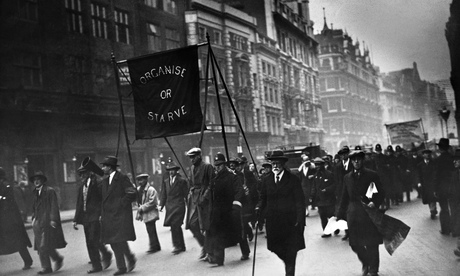The income tax system needs reshaping. This is not easy. But nor is reducing the state to its smallest level for 80 years

If the Conservative party forms the next government, by 2020 the state will probably be the smallest it has been – in relation to GDP – for 80 years. So declared the Office for Budget Responsibility last Wednesday, in the wake of the autumn statement. By 2020, spending per head of population will have fallen by around a third in 10 years. In some areas – in our cities and our criminal justice system – the reductions will be even more draconian. This is the most dramatic change in state capability that any British government has ever engineered.
The chancellor may complain about the “hyperbolic” tone of some BBC reporting. But surely only in a one-party state would this dramatic plan not be discussed in appropriately dramatic terms. Britain is to become the site of a massive experiment in economic and social libertarianism whose authors have never fessed up to the sheer audacity and scale of what they are doing. They have just dumbly insisted there is no alternative. The autumn statement was the moment the implications became clear.
A financial crisis has been allowed to morph into a crisis of public provision because the government of the day will not lift a finger to compensate for the haemorrhaging of the UK tax base. What the state does is not the subject of a collective decision with concerned weighing of options. Instead, it’s an afterthought, with the greater priorities a reduction in public borrowing and freezing or lowering tax rates.
All the state can spend is what is left after those two greater priorities are met, and if it has to shrink to pre-modern levels then so be it. The market will provide: charity will alleviate suffering; people will get by; the roof will not fall in. Lifting taxation can never be considered to close the gap. It is, it is alleged, both economically self-defeating and immoral.
A cool £54bn has gone missing since 2010. Then the government projected that in 2014/15 its total tax revenues would be £700bn. In fact, they will be £646bn, according to the OBR. Public spending, on the other hand, has behaved almost exactly as forecast. In 2010, the government projected that its spending would be £738bn in this financial year. The Treasury is to be congratulated on its capacities as national book-keeper in chief. The actual figure is £737bn, an accuracy I doubt many private companies could reproduce – or even individual readers of the Observer. It is not runaway public spending that is causing borrowing to stay stubbornly high, thus triggering the extreme shrinkage of the state: it is the hollowing out of the tax base.
There are three principal causes. The first is that the structure of the economic recovery is delivering a reduced tax yield. There are too many low-paying jobs and pay on average is stagnating, so that aggregate income tax revenues are growing much less rapidly than in previous recoveries. We are drinking and smoking less, so there is less revenue from alcohol and tobacco duties. Altogether this accounts for around a third of the shortfall.
Another third is a result of the chancellor wanting to show his tax-cutting credentials as a true Thatcherite man: he has cut corporate tax rates, frozen the business rate, not adjusted council tax bands upwards, not increased petrol duties, lowered the top rate of tax and increased personal allowances. The last element is down to our living with an epidemic of tax avoidance and evasion, as the last G20 summit recognised – and which even Osborne says he deplores. Too many companies and rich individuals are gaming the system.
Put all this together and Britain has lost that £54bn. But matters are made worse by the interaction of Britain’s highly centralised Treasury and a chancellor with Osborne’s instincts. Giles Wilkes, former adviser to Vince Cable, and Stian Westlake, research director at Nesta, write in an important paper, The End of the Treasury, that the Treasury inverts the way that spending and taxing decisions should be made. It starts with a target for borrowing, not differentiating great capital projects such as London’s Crossrail from spending on the NHS. Then it projects tax revenues assuming no changes, and sets aside money for fixed obligations, such as pensions.
Finally, departments fight over the left-overs on a year by year basis, with the Treasury policing spending with a ferocious rigidity. The benefit is that it can control spending to the last billion. The cost is that there is never a weighing up of the benefits of raising taxes against a particular use for public spending, nor any strategic long-term programme of investment.
This is bad enough in ordinary times, but when a chancellor refuses to consider raising taxes as the tax base collapses it is a recipe for disaster. It results in a minimal state, with implications for prisons, schools, courts, policing, legal aid, care, security and defence that are profound. Some of this could be avoided if, as both Labour and the LibDems propose, capital investment was not lumped in with current spending so that virtuous borrowing could be separated out. The country may also get lucky: wages stop stagnating and income tax receipts rise.
But the bigger truth is that if Britain wants the scale of public activity congruent with a civilised society, it has to be paid for. The reaction will be hysterical, but lifting taxes by 3% of GDP to 38.5% to find the missing £54bn will still leave Britain below the crucial 40% benchmark, thus undertaxed by comparison with most advanced countries. The whole system of property taxation needs overhauling. The VAT base can be broadened. Environmental taxes can be extended. Osborne’s proposals to ensure companies pay tax on UK revenues need to be tougher and introduced earlier. The income tax system needs reshaping.
None of this is easy. But neither is reducing the state to its smallest level for 80 years. Reducing spending on schools further is surely short changing our children. How much smaller should the army, navy and air force become? Is the welfare system to return to a system of discretionary poor relief? Do we share the libertarian view that the state is worthless – and there is no co-dependency between public and private? What role do we want the state to have in our civilisation? The right would have it that none of these questions can be asked because all involve an increase in taxation: our only future is a 1930s scale state.
There is a different future, and our politicians of the centre and left have to argue for it, but they must accept it has to be paid for. This has become an existential divide. Politics and political argument have never mattered more.

No comments:
Post a Comment